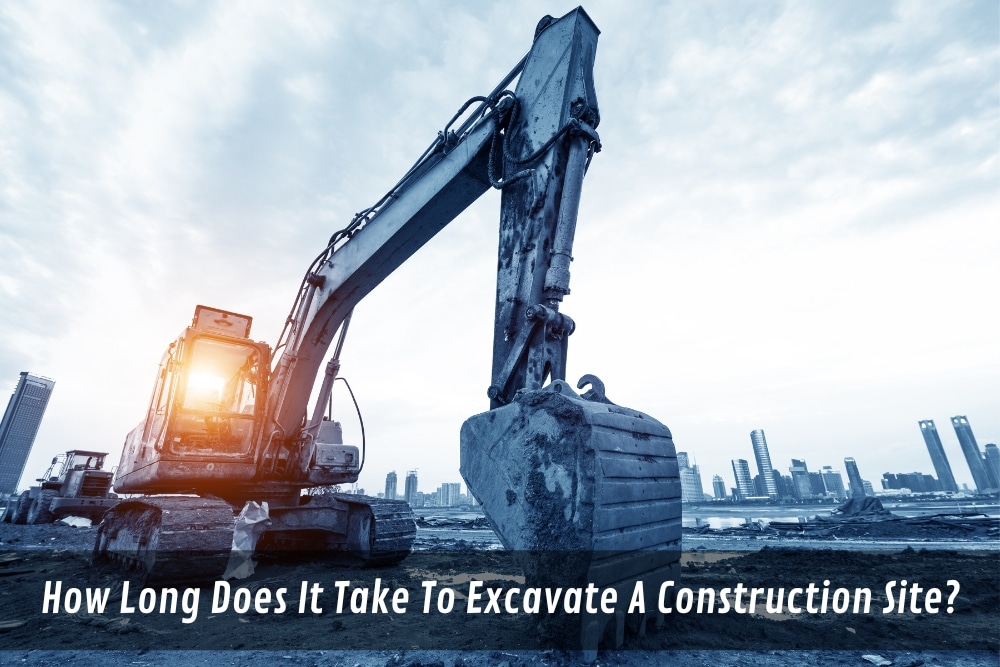The excavation process is a crucial step in any construction project. It involves the removal of soil, rock, and other materials to create a foundation for buildings or infrastructure. It is a process that requires precision and expertise to ensure that the excavation is done safely and efficiently.
One question that often comes up in the construction industry is, “How long does it take to excavate a construction site?” The answer to this question is not straightforward, as several factors come into play. Such as the size of the site, the depth of the excavation, the type of soil, and the equipment used. In this blog post, we will dive into the excavation process. We will also explore the various factors that affect how long it takes to excavate a construction site.
What is excavation?
Excavation refers to the process of removing earth or other materials from a construction site or other location. This may involve digging, dredging, or scooping out soil, rock, or other materials to create a hole or cavity in the ground. Excavation is typically performed for a variety of reasons. Such as to prepare a site for construction, to install underground utilities, or to access natural resources such as minerals or oil. The excavation process can be complex and may involve the use of heavy equipment and skilled personnel. This is to ensure that the work is performed safely and efficiently.
What are the various factors that can impact the process of excavation?
The following are some of the factors that can impact the process of excavation:
- Soil type: Different types of soil have varying levels of hardness and cohesion, which can impact the ease of excavation. For instance, soft and loose soil can be easily excavated with a backhoe. While hard rock will require more specialised equipment like a rock breaker.
- Weather conditions: Heavy rainfall, snow, or strong winds can make excavation work challenging. It may cause delays or even force the project to halt temporarily.
- Location: Excavation in urban areas requires careful planning to avoid damage to existing infrastructure like pipelines, electrical cables, or underground structures. Similarly, excavations in remote areas can be difficult due to limited access to resources and services.
- Depth: Excavating deeper into the ground requires specialised equipment and techniques. It can also impact the stability of the excavation site.
- Environmental considerations: Excavation activities can have environmental impacts such as soil erosion, deforestation, and air pollution. Therefore, it is important to take steps to mitigate these impacts, such as following erosion control measures for construction or ensuring proper disposal of waste materials.
- Safety regulations: Excavation work involves various hazards such as collapsing soil, falling objects, or heavy machinery accidents. To ensure the safety of workers and the public, strict safety regulations must be followed during excavation work.
- Budget: The cost of excavation can vary depending on the size and complexity of the project, as well as the availability of equipment and labour. Proper budget planning and cost estimation are critical to the success of any excavation project.
What are the steps involved in the excavation process?
The excavation process involves several steps, which may vary depending on the specific site and project requirements. The following are some of the typical steps involved in the excavation process:
- Planning and preparation: Before excavation work can begin, the site must be surveyed and marked to determine the size and boundaries of the excavation area. The type of foundation and soil conditions must also be considered, and permits and approvals obtained from local authorities.
- Clearing and stripping: The job site must be cleared of any obstacles, such as trees, rocks, or debris, that may impede the excavation process. The topsoil may also be stripped to expose the underlying earth rock.
- Excavation: The actual excavation work begins, using tools and machinery. Such as excavators, backhoes, and bulldozers. The size and depth of the excavation will depend on the specific project requirements. Such as the size and type of foundation being built.
- Removal of excavated materials: The materials excavated from the site, such as earth rock or large boulders, must be removed and disposed of properly. The excavation may also involve backfilling, where the soil is returned to the excavation site to fill any voids.
- Environmental measures: Throughout the excavation process, measures must be taken to minimise the impact on the surrounding natural habitat. This may include erosion control measures, dust suppression, and minimising noise and vibrations.
- Safety measures: To ensure the safety of workers and the public, strict safety measures must be followed throughout the excavation process.
- Completion and site restoration: Once the excavation work is complete, the site may be restored to its original state, or prepared for the next phase of construction. This may include compacting the soil, installing drainage systems, or laying the foundation for the building.
In summary, the excavation process can be complex and involve several factors. Proper planning, preparation, and execution are essential to ensure a successful excavation and construction project.
What is the average excavation time for various types of projects?
The average excavation time for various types of projects can vary depending on several factors. The following are some examples of average excavation times for various types of projects:
- Residential foundation excavation: Excavating for a typical residential foundation can take between 1-3 days, depending on the size and depth of the excavation, soil conditions, and any obstructions or challenges encountered during the excavation. This may also depend on factors such as the need for a crawl space or a 10-foot over-dig.
- Commercial building excavation: Excavating for a commercial building can take anywhere from several weeks to several months. Depending on the size and complexity of the project.
- Infrastructure excavation: Excavating for infrastructure projects such as roads, bridges, or pipelines can take several months or even years, depending on the scale of the project.
- Emergency excavation: Excavating for emergency situations such as water main breaks or sinkholes can take anywhere from a few hours to several days, depending on the size and severity of the problem.
What are some effective methods for minimising excavation time?
The following are some examples of methods that can be used to reduce excavation time:
- Proper planning: One of the most effective ways to minimise excavation time is to ensure that the excavation process is properly planned and executed. This may involve conducting a thorough site assessment. This is to identify any potential obstacles or challenges that may impact the excavation process. Additionally, it is important to establish clear project goals and timelines. Also, it is important to develop a detailed excavation plan.
- Use of advanced equipment: The use of advanced equipment such as excavators, backhoes, and bulldozers can help to speed up the excavation process. These machines can perform tasks much more quickly and efficiently than manual labour. It helps to reduce the overall excavation time.
- Experienced personnel: Experienced personnel who are familiar with the excavation process can help to ensure that the work is completed efficiently and safely. Experienced operators can help to minimise downtime and delays. By quickly identifying and addressing any issues that may arise during the excavation process.
- Coordination with other construction activities: Coordinating the excavation process with other construction activities can help to minimise excavation time. For example, excavation work can be conducted while other trades are working on adjacent areas of the construction site. This can help to reduce the overall duration of the project.
- Use of alternative excavation methods: Alternative excavation methods such as trenchless excavation can help to minimise the excavation period by reducing the need for extensive digging. This can be particularly useful in urban areas where space is limited.
Conclusion
Overall, the time it takes to excavate a construction site can vary widely depending on a variety of factors. Such as the size and complexity of the project, soil and rock conditions, and the type of excavation required. The average excavation times for various types of projects can range from a few hours for emergency situations to several months or even years for large infrastructure projects. To minimise excavation time, proper planning, the use of advanced equipment, and experienced personnel can be employed. By optimising the excavation process, construction teams can help ensure that projects are completed efficiently, safely, and within budget.
If you are planning a construction project that involves excavation, it is important to work with a reputable and experienced demolition company like Almighty Demolition. With our expertise and advanced equipment, we can help you to efficiently and safely excavate your construction site, minimising excavation time and helping your project stay on schedule and within budget. Contact us today to learn more about our services and how we can assist with your excavation needs.







